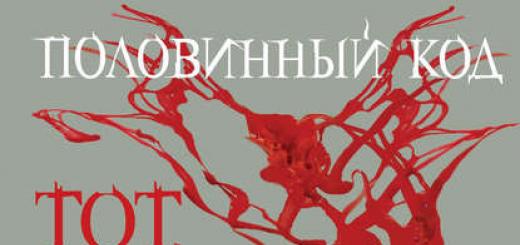In the spring of 1921, Blok fell seriously ill, this was due to the hungry years of the civil war, and with great exhaustion. nervous system, perhaps, and with the creative crisis that came after the poem "The Twelve".
S. M. Alyansky, the only one who, apart from his relatives, visited the dying poet, writes: “Alexander Alexandrovich overcame the whole second half of May and almost the whole of June. Then he fell ill and tried to work while sitting in bed. However, Lyubov Dmitrievna and everyone who came these days to Officers' Street to find out about Blok's health, hoped for a recovery, no one thought about the terrible outcome of the disease.
Only Alexander Alexandrovich must have had a premonition of his imminent departure. He carefully prepared for it and was worried that he would not have time to do everything he had planned, and therefore he was in a hurry.
Further, the memoirist tells an episode that occurred during Blok’s illness: “... A few days later, Lyubov Dmitrievna, opening the door for me, hastily turned her back. I managed to notice tearful eyes. She asked me to wait, and, as always, I went into a small room Lyubov Dmitrievna soon returned and said that today Sasha was very nervous, that she asked me, if I was not in a hurry, to sit: maybe my help would be needed - to go to the pharmacy. But ten minutes had not passed, suddenly I heard "Alexander Alexandrovich's terrible cry. I ran out into the hall, from where the door led to the patient's room. At that moment the door opened, and Lyubov Dmitrievna ran out of the room with tear-filled eyes... A little later I heard Lyubov Dmitrievna return to the patient. minutes, she came to me and told me what happened. She suggested that Alexander Alexandrovich take some medicine, and he refused, she tried to persuade him. with extraordinary fury he grabbed a handful of medicine bottles that were on the table by the bed, and threw them with force against the stove.
On another occasion Blok took away and destroyed some of his notebooks in front of a guest. “If I could assume that Blok destroys diaries and notebooks in a fit of irritation, then the fact of destruction would not surprise me. But this happened before my eyes, outwardly Blok remained completely calm and even cheerful. condition particularly shocked me," writes the memoirist.
And here is a description of the last meeting with the poet: “He invited me to sit down, asked, as always, what was with me as a wife, what was new. I began to tell something and soon noticed that Blok’s eyes were turned to the ceiling, that he didn’t I interrupted the story and asked him how he felt and if he needed anything.
- No, thank you, I don’t have any pains now, only, you know, I completely stopped hearing, as if a huge wall had grown. I can’t hear anything anymore,” he repeated, fell silent and, as if tired of what had been said, closed his eyes. I understood that it was not physical deafness... It seemed to me that I was sitting for a long time. Alexander Alexandrovich is breathing heavily, lies with his eyes closed, must have dozed off. Finally I make up my mind, I get up to slowly go out. Suddenly he heard a rustle, opened his eyes, somehow helplessly smiled and said quietly:
- Forgive me, dear Samuil Mironovich, I am very tired.
Those were the last words I heard from him. I never saw a living Blok again."
Another contemporary of the poet, Georgy Ivanov, writes that the doctors who treated Blok “could not determine what he actually was sick with. At first they tried to reinforce his rapidly falling strength for no apparent reason, then when he became why, unbearably suffer, they began to inject morphine into him ... But still, what did he die of? "The poet is dying because he has nothing else to breathe. " These words, spoken by Blok at the Pushkin evening, shortly before his death, are perhaps the only correct diagnosis of his illness.
A few days before Blok's death, a rumor spread in St. Petersburg: Blok had gone mad. This rumor certainly came from Bolshevik literary circles. Subsequently, Soviet journals said in different options about Blok's near-death "madness". But no one mentioned one significant detail: the dying Blok was visited by an "enlightened dignitary", it seems, now safely shot, the head of Petrogoslitizdat Ionov. Block was already unconscious. He was constantly delirious. He raved about the same thing: were all copies of the Twelve destroyed? Is there still one left somewhere?
- "Lyuba, look carefully, and burn, burn everything." Lyubov Dmitrievna, Blok's wife, patiently repeated that everyone had been destroyed, not a single one was left. Blok calmed down for a while, then started again: he made his wife swear that she was not deceiving him, remembering the copy sent to Bryusov, demanded to take himself to Moscow.
- I will force him to give it back, I will kill him ... And the head of Petrogoslitizdat, Ionov, listened to this nonsense of a dying ... ".
According to K. Chukovsky, in "the beginning of July it began to seem that he was getting better ... on the 25th there was a sharp deterioration; they thought to take him out of town, but the doctor said that he was too weak and would not survive the move. By the beginning of August, he had already almost all the time he was in oblivion, at night he was delirious and screamed with a terrible cry, which he will not forget for a lifetime ... "
In Blok's "Brief Note on the Course of the Disease" of Blok, the doctor A. G. Pekelis, who observed the poet, stated: "... The process was fatally coming to an end. Edema slowly but steadily grew, general weakness increased, and abnormalities in the psyche were manifested more and more noticeably and sharply , mainly in the sense of oppression ... All the measures taken of a therapeutic nature did not reach the goal, and in Lately the patient began to refuse to take medication, lost his appetite, quickly lost weight, melted and faded more noticeably, and quietly died with increasing symptoms of heart weakness.
It happened on August 7, 1921 at 10 o'clock. 30 minutes. Andrey Bely in a letter to V. F. Khodasevich dated August 9, 1921, he said: “Dear Vladislav Felitsianovich, I arrived only on August 8 from Tsarskoye: I found your letter. I answer: Blok was gone. became especially ill from Monday. He died in full consciousness. Today and tomorrow memorial services. Carrying out of the body on Wednesday the 11th at 10 o'clock in the morning. Burial at the Smolensk cemetery. Yes! a part of me left with him. After all, they didn’t see each other, they hardly spoke, but simply Blok’s “existence” on the physical plane was for me like an organ of sight or hearing; I feel it now. It is possible for the blind to live. The blind either die or become enlightened inwardly: that's what hit me with his death: wake up or die: begin or end.
When, soul, you asked to die or to love...
And the soul asks: love or death; real human, humane life or death. The soul cannot live as an orangutan. And Blok's death for me is a call to "die or love"
Blok's other contemporaries perceived Blok's death with incredible pain. In the diary Korney Chukovsky there is this entry (August 12, 1921):
"Never in my life have I been so sad ... sad to the point of suicide.<...>In the grave is his voice, his handwriting, his amazing cleanliness, his flowering hair, his knowledge of Latin, German, his small graceful ears, his habits, loves, "his decadence", "his realism", his wrinkles - all this is underground , in the earth, the earth... There were no events in his life. "Went to Bad Nauhiem". He didn't do anything, he just sang. Some kind of endless song flowed through him in a continuous stream. Twenty years from 98 to 1918. And then he stopped - and immediately began to die. His song was his life. The song is over, and he is over."
Years later, reflecting on the death (that's right: death!) of Blok, Vladislav Khodasevich wrote: "In Pushkin's speech, exactly six months before his death, he said: "Peace and freedom. They are necessary for the poet to release harmony. But peace and will are also taken away. Not external peace, but creative. Not a childish will, not the freedom to be liberal, but a creative will, a secret freedom. And the poet dies because he has nothing else to breathe: life has lost its meaning.
Probably, the one who first said that Blok suffocated took it from here. And he was right. Isn't it strange: Blok was dying for several months, in front of everyone, he was treated by doctors - and no one named and did not know how to name his illness. It started with pain in my leg. Then they talked about the weakness of the heart. Before his death, he suffered greatly. But why did he die anyway? Unknown. He died somehow "in general" because he was all sick, because he could no longer live. He died of death."
But that is the definition of a poet. Let us descend, however, from the mountain heights and listen to what doctors say who love precision and certainty. Having reconstructed Blok’s illness and death according to documents and memoirs of his contemporaries, Doctor of Medical Sciences M. M. Shcherba and Candidate of Medical Sciences L. A. Baturina claim that the poet “died from subacute septic endocarditis (inflammation of the inner lining of the heart), incurable before the use of antibiotics. Subacute septic endocarditis is a "slowly creeping inflammation of the heart", usually seen between the ages of 20-40, more often in men, the onset of the disease is always subtle, there is no indication of heart disease, the condition worsens gradually, complaints of weakness, malaise, fatigue, weight loss, up to exhaustion.Fever is the most constant symptom: at first, the temperature rise is insignificant, then up to 39 ° and above ... Along with this, chills, progressive anemia.Heart damage is expressed in valvular disease (due to endocarditis) and in the myocardium ( inflammation of the middle, muscular layer of the heart).One of the characteristic manifestations of subacute septicemia whom endocarditis - multiple embolisms (ie. e. blockage, most often by a thrombus) of small and large vessels of the brain, internal organs, skin, limbs. As a result of changes in the cerebral vessels, a picture of meningoencephalitis (inflammation of the brain and its membrane) develops. The immediate cause of death is heart failure or embolism. The duration of the disease is from three months to several years (Usually 1.5-2 years) ... Mental overstrain and malnutrition dramatically, 3-4 times, increase the incidence of subacute septic endocarditis ... The causative agent of infection is usually microbes that are in the oral cavity, upper respiratory tract, infected teeth, tonsils..."
Wow, what prose! Far more sublime: "He died from the fact that he could no longer live."
An obvious mistake - only S. M. Alyansky visited Blok. The confusion occurred because G. Ivanov wrote about this episode from other people's words.
Soviet commentators disputed this episode, referring, in particular, to the memoirs of K. Fedin, according to which Blok allegedly said in February 1921: “I now think the same way as I thought when I wrote The Twelve.” But, knowing the duplicity of K. Fedin, one should recognize his "evidence" as highly doubtful.
The biggest mystery is his incomprehensible illness and sudden death. The official diagnosis was made - acute endocarditis. But it's just incredible how a slender, clear-eyed, handsome man with a good complexion could burn out so quickly. According to relatives, Blok did not have a bad heredity and he rarely went to doctors. The poet Georgy Ivanov wrote: “The doctors who treated Blok could not determine what, in fact, he was ill with. At first they tried to somehow reinforce his strength, which was rapidly falling for no apparent reason, then, when he began to suffer unbearably, it is not known from what, they began to inject him with morphine.
Here is the history of his illness: in April 1921 he felt unwell. However, after the experienced winter with “every second lack of money, lack of bread”, all the inhabitants of St. Petersburg experienced these ailments. He was constantly visited by Dr. Pekelis, who was his friend, and did not find anything dangerous in his condition.
In early May, the poet travels to Moscow on the same train with Korney Chukovsky, for a literary evening at the Polytechnic Institute. Chukovsky notes that Blok has changed dramatically, has become "hard, gnawed, with empty eyes, as if covered with cobwebs." On this ill-fated evening there was a scandal.
When Blok read an excerpt from his poem, someone from the crowd shouted out that his poems were dead. An ugly fight began, the poet was taken out by his friends and admirers. After this incident, Blok completely lost heart and, when he arrived at home, he did not even smile at his wife. At night Blok slept very badly, he had nightmares.
On May 17, a chill appeared: the whole body ached, especially the arms and legs. Alexander was put to bed, and in the evening the doctor came. The temperature was 39, but the poet complained only of general weakness and heaviness in his head. The doctor listened to his heart and found that it was enlarged to the left by a finger and to the right by ½. However, there was no arrhythmia and edema. On the part of the respiratory and circulatory organs, Pekelis did not reveal any pathology. Despite the fact that the symptoms were more than strange, the doctor expressed the only possible suggestion that Blok could have acute endocarditis as a complication of the flu.
The poet was getting worse every day, there were severe pains that made him furious. One day he went to the stove to warm himself. Lyubov Dmitrievna began to persuade her husband to go to bed, but with tears he began to grab and beat everything in a row: the vase that she gave him, the mirror ... Lyubov Dmitrievna recalled how he once smashed Apollo standing on the chest of drawers with a poker. Having calmed down a bit, Blok said to his frightened wife: “I wanted to see how many pieces this dirty mug would fall apart.”
On the days when the pains passed, the poet dismantled and destroyed archives, notebooks, records. He was especially careful to destroy all copies of the Twelve. After nights spent in nightmares, he constantly repeated to his wife, as if in delirium: "Lyuba, look well, and burn it, burn it all."
At the beginning of June, Dr. Pekelis, after consulting with other doctors, filed a petition for the need to send the sick Blok to Finland. Maxim Gorky and People's Commissar Lunacharsky joined the petition.
The Politburo also drew up the following resolution: “Block is a poetic nature; some story will make a bad impression on him, and he will quite naturally write poetry against us. I don't think it should be released."
By the beginning of August, Blok was already almost all the time in oblivion, he was delirious at night and screamed in terrible pain. Doctors gave him injections of morphine, which was a common painkiller at the time, but even they did not help. However, during this period, after long repeated requests, the Politburo finally allowed to leave for Finland. But it took time to get a passport.
The doctors didn't know what to do. Samuil Alyansky recalled that one day Pekelis gave him a recipe and asked him to bring "medicines": sugar, white flour, rice, lemons. But even this recipe required a resolution from the Petrogubcommune. Alyansky, not finding the manager in the place, went to the market and bought some of the products himself. But they no longer helped - on that day Blok died, leaving relatives, friends and doctors in confusion. Thousands of townspeople came to the funeral, and the coffin was carried six kilometers in their arms to the Smolensk cemetery, which in itself was amazing in a starving and sick city.
After his death, there were many speculations about the true cause of his death. Officially, he died of starvation, scurvy, and exhaustion. One literary critic even said that it was syphilis. Consequently, during the treatment with mercury preparations, poisoning of the body occurred. We already know the version of the attending physician - acute endocarditis. As for Mayakovsky, Chukovsky, Solovyov and his other literary friends, they were convinced that the poet had been poisoned by the special services. By the way, later Ionov, who tried to investigate the causes of Blok's death, was sentenced to death.
Alexander Blok himself, shortly before his death, said: "The poet dies because he has nothing more to breathe." Although this is not a diagnosis of his fatal illness, but the only explanation for the strange and untimely death.
http://repin.info/celebrity/alexander_bloks_mysterious_death #comments
Block memory.
Roman Kamnev
I leave my heart to you.
You take care of him, friends.
The night will begin and the song will sing,
A song about not letting go.
And how sweet it is to freeze then,
In the dark, listen to the torn pulse.
Come, cursed death,
Now I'm not afraid of anything.
Let the dawn come, and the day
Light will cover the empty bed.
Nothing will happen to me
And you don't have to sing me.
I leave you my songs
And few coal-words.
I want to be in my beloved land
The leaves were still green.
The sun will also rise and set
To the far edge of the earth
Only the wind will not find me
And the trees have grown.
But even in this ordinary hour
Somewhere they will whisper and love.
These people are happier than us
But without us, they might not exist...
On May 7, 1921, Blok read his poems at the Moscow Press House.
After the reading was over, a mediocre poet jumped onto the stage, whom Blok had publicly reprimanded not so long ago, and declared that now everyone present had heard the verses of a dead man.
A roar of indignation arose in the hall, only Blok remained imperturbable. He leaned over to Chukovsky, who was present, and said: "He is burning the truth: I am dead."
Someone is afraid of death, someone is indifferent to it. It can be said about Blok that he ... loved death. This can be seen in his poems, his diaries, statements.
The same Chukovsky writes in his memoirs: “Blok pronounced the very word DEATH ... very emphatically, in his conversations it was more noticeable than all his other words.”
Death in Blok flies from poem to poem, from cycle to cycle, from book to book. In “Poems about a Beautiful Lady” he says: “I celebrated a bright death ...” Celebrated! So no one talked about death.
The first edition of Alexander Blok's book
"Poems about a beautiful lady" 1905
with an autograph to the famous Pushkinist P. E. Shchegolev
Many times Blok came close to suicide. The reason for this is the relationship, first with her lover, and then with her wife, Lyubov Dmitrievna Mendeleeva. Blok saw in her an ideal, the embodiment of the Beautiful Lady, and she wanted him to see in her ordinary person, an earthly woman who needs not only sublime love. But also quite down to earth. Such is the misunderstanding. 
Lyubov Dmitrievna Mendeleeva - wife of A. A. Blok
In world literature, we can find many images of death. Peru Blok owns one of the most poetic:
She calls, she beckons.
In the snows of the earth and firmament.
What is singing to me? What is calling me?
Another life! Silly death?
Blok believes (at least for the time being) that "it is given to the dead to give birth to the word raging with life", and if so, then "Death is Beauty".
Blok changes his attitude towards death after the loss of his son. Not his. His wife. Despite her betrayal and the fact that Blok was not the father of the child, he accepted him as his own and fell in love with him very much. The boy died a week after birth. Blok writes poems "On the death of a baby", in which he refuses to thank God for the test sent down. He talks about praying to the "holy little coffin" but without God.
And here is what he will write after the death of his father, whom he, however, knew little, since he and the poet's mother broke up when she was still pregnant: “I found my father already dead. I really like him, his face is calm, thin and pale.
Again admiring death. The block becomes itself.
Here is what he wrote to his mother in the same 1909 (the year of the loss of his son and father): “I love only art, children and death.” Like this! Even "dead" Latin language he knew perfectly.
But back to my father's death. Paradoxically (although, in the case of Blok, not at all paradoxical), but she (death) helped Blok find his father.
“For me, the inner appearance of my father is revealed - in many ways, in a completely new way,” he writes to his mother after the funeral. “Everything testifies to the nobility and loftiness of his spirit, to some extraordinary loneliness and exceptional largeness of nature.” 
Alexander Lvovich Blok, father of the poet A. A. Blok

The mother of the poet Alexandra Andreevna with her son
The death of his father helped Blok find another loved one - a sister (his father's daughter from his second marriage, which also broke up a long time ago). Before that, he had not even suspected of her existence, as, indeed, she did about his.
“Let us both remember,” Alexander Blok wrote to his sister Angelina, “that God judged us to meet at the hour of redemption – at the tomb.”
Angelina died at the age of 25, 3 and a half years ahead of her brother. In March 1918, Blok wrote: “Today I learned that my sister had died ... She had to die - she was brought up to death that way.” 
Angelina - the poet's sister
A fan of death, death, he enthusiastically accepts the revolution that brings destruction and death, but only at first ... Later, he begins to talk about peace and freedom.
“They are necessary for the poet to release harmony. But peace and will are also taken away. Not a childish will, not the freedom to be liberal, but a creative will, a secret freedom. And the poet dies, because he has nothing to breathe; life has lost its meaning. - Blok first said this on February 11, 1921. He had one hundred and seventy-seven days to live.
Blok was waiting for death: “When you look into a dark corner and wait for death from the darkness,” this is an appeal, first of all, to oneself. And then it happened: “I am finally mortally ill.” Finally! Keyword!
In April 1921, Blok's text "Neither dreams nor reality" was published in the journal Notes of Dreamers. It is the text, since it is very difficult to attribute it to any genre. These are small prose passages connected only by the fact that what is happening in them could appear to the narrator both in reality and in a dream. BUT main image of all these passages - the image of the soul traveling through the world apart from the body.
At the end of May 1921, he was diagnosed with endocarditis (inflammation of the valvular system of the heart) and strongly recommended to go abroad. Blok agrees only to Finland - this is the closest foreign country. It happened, we recall, already in Soviet Russia, and therefore, in order to travel outside it, it was necessary to bypass a bunch of offices and collect a bunch of documents. The ordeals were long, but the permission to leave nevertheless came ... the next day after ... the death of the poet, on August 8, 1921. 
Deathbed Block

Death mask of Alexander Blok
They buried him the next day. The sun shone brightly in August, but it was windy. The poet's dream "to die under a ringing blizzard" did not come true. 
The funeral of Alexander Blok
“If I died now, a lot of people would follow my coffin, and there would be a handful of young people,” Blok wrote. He was mistaken in only one thing: the youth was not at all a handful. The coffin was carried by hand. When the coffin was lowered into the grave, Anna Akhmatova, standing next to her, cried. Then she describes it in verse:
We brought the Smolensk intercessor,
Brought to the Most Holy Theotokos,
On the hands in a silver coffin
Our sun is extinguished in flour, -
Alexander, pure swan.
Alexander Alexandrovich Blok was buried at the Smolensk cemetery in Petrograd. 
Grave of Alexander Alexandrovich Blok
at the Smolensk cemetery in St. Petersburg
Before his death, he managed to tell his mother that, if it were his will, he would burn all his works, except for "Poems about the Beautiful Lady."
Thank God it didn't happen. Yes, it just couldn't happen.
“My songs are sung everywhere, songs about my life,” Gaetan says these words. The character of Blok's poem "The Rose and the Cross". The hero of the poem received his name in honor of the Catholic saint, whose day is celebrated on August 7th.
It was on August 7 at 10:30 am that Alexander Blok died.
At the age of 16, Blok became interested in theater. In February 1921, at an evening in memory of Alexander Pushkin at the House of Writers, Blok delivered his famous speech "On the Appointment of a Poet." In 1909, his father dies - and for the first time, Blok begins to have heart problems. On July 7, 1916, Blok was called to serve in the engineering unit of the All-Russian Zemsky Union. The poet served in Belarus. Alexander Blok. Gray Morning. Poems. I say: "Alexander Blok ...".
Then he took to his bed and tried to work while sitting in bed. Blok took away and destroyed some of his notebooks in front of the guest. Aleksandrovich breathes heavily, lies with his eyes closed, must have dozed off. I never saw a living Blok again.” Ionov*. Block was already unconscious. Blok, patiently repeated that all were destroyed, not a single one was left.
Dmitry Bykov
Mad Block
He died fully conscious. Blok and his other contemporaries. There were no events in his life. Block suffocated, took it from here. In 1897, having found himself abroad with his mother, in the German resort town of Bad Nauheim, the 16-year-old Blok experienced his first strong youthful love for the 37-year-old Xenia Sadovskaya.

In 1897, at a funeral in St. Petersburg, he met with Vladimir Solovyov. Blok wrote his first poems at the age of five. At the age of 10, Alexander Blok wrote two issues of the Ship magazine. Since childhood, Alexander Blok spent every summer in the estate of his grandfather Shakhmatovo near Moscow. On this basis, Blok had a conflict with Andrei Bely, described in the play "Balaganchik".
For Italian poetry, Blok was accepted into a society called the Academy. In the summer of 1911 Blok traveled abroad again, this time to France, Belgium and the Netherlands. By his own admission in a letter to his mother, during the war his main interests were "food and horses."
The ever-increasing volume of work undermined the strength of the poet. Fatigue began to accumulate - Blok described his condition of that period with the words "I was drunk." In the spring of 1921, Alexander Blok, together with Fyodor Sologub, asked for exit visas. The issue was considered by the Politburo of the Central Committee of the RCP(b).
Today, March 15 in history:
Lunacharsky noted: “We literally tortured him without releasing the poet and at the same time without giving him the necessary satisfactory conditions.” Before recent years Alexander Blok's second cousin, Ksenia Vladimirovna Beketova, lived in St. Petersburg. Among the relatives of Blok - Chief Editor magazine "Our Heritage" - Vladimir Enisherlov. Particularly characteristic in this regard is the classic juxtaposition of the foggy silhouette of the “Stranger” and “drunkards with rabbit eyes,” which has become a textbook.

In 1917-18, Blok was undoubtedly captured by the spontaneous side of the revolution. Blok openly joined the Bolsheviks. I published an article that Kogan admires (P.S.). The song is generally simple, and Blok is a stupid person. Blok tried to comprehend the October Revolution not only in journalism, but also, which is especially significant, in his poem The Twelve (1918), unlike all previous works.
The language style of the poem "The Twelve" was perceived by contemporaries not only as deeply new, but also as the only one possible at that moment. In February 1919 Blok was arrested by the Petrograd Extraordinary Commission.
Honored Artist of Russia died in St. Petersburg
The rethinking of the revolutionary events and the fate of Russia was accompanied by a deep creative crisis for Blok, depression and a progressive illness. Apparently, Blok wrote a story about Mogilev, but did not have time to publish it.

1234k. And. n. Shepelev, V, Lyubimov, V. "He will write poetry against us." The truth about the illness and death of Alexander Blok (Russian) // Source. Nikolai Punin and Alexander Blok // Crossroads of Arts Russia-West (Proceedings of the Faculty of History of the St. Petersburg state university No. 25). SPb., 2016. S. 177-184. Alexander Blok (1880-1921) was born into the family of the daughter of the rector of St. Petersburg University and a Warsaw lawyer.
The book of his poems "Poems about a Beautiful Lady" is dedicated to her. In 1909, Blok experienced a strong emotional shock: his father died, then his child. It is likely that his love for everything Russian led to the fact that in 1917 the poet refused to emigrate, as he believed that he should be with Russia in difficult times.
(1880 - 1921) Russian poet
Blok practically stopped writing poetry, as revolutionary deeds “drunk” him. According to relatives, Blok did not have a bad heredity and he rarely went to doctors. Here is the history of his illness: in April 1921 he felt unwell.

I announce: “Alexander Blok…”
He was constantly visited by Dr. Pekelis, who was his friend, and did not find anything dangerous in his condition. Chukovsky notes that Blok has changed dramatically, has become "hard, gnawed, with empty eyes, as if covered with cobwebs."
When Blok read an excerpt from his poem, someone from the crowd shouted out that his poems were dead. After this incident, Blok completely lost heart and, when he arrived at home, he did not even smile at his wife. At night Blok slept very badly, he had nightmares. On May 17, a chill appeared: the whole body ached, especially the arms and legs. Alexander was put to bed, and in the evening the doctor came. The temperature was 39, but the poet complained only of general weakness and heaviness in his head.

Despite the fact that the symptoms were more than strange, the doctor expressed the only possible suggestion that Blok could have acute endocarditis as a complication of the flu. At the beginning of June, Dr. Pekelis, after consulting with other doctors, filed a petition for the need to send the sick Blok to Finland.
But they no longer helped - on that day Blok died, leaving relatives, friends and doctors in confusion. As for Mayakovsky, Chukovsky, Solovyov and his other literary friends, they were convinced that the poet had been poisoned by the special services. By the way, later Ionov, who tried to investigate the causes of Blok's death, was sentenced to death.
Alexander Blok on his deathbed. Photo by Moses Nappelbaum. In our posts, we have already touched on the issues of diagnosis and the causes of death of our great poets. But with the death of another great poet, who died in a very difficult year for everyone in 1921, everything is not so simple. What else do we know about Blok's childhood illnesses? At the age of 12 - otitis, at 13 - measles with prolonged bronchitis.
Of course, all these assumptions require proof. Alexander Blok left at 41 very young
What is really bad is that the boy was the only one in the family, and they always shook over him, and exaggerated all his illnesses. Yes, and all my friends talk about Blok's radiant health. However, after five years the problems begin.
The great poet Alexander Blok died of an unknown illness at the age of 41. His death was a complete surprise for both relatives and doctors. Alexander Blok himself, shortly before his death, said: "The poet dies because he has nothing more to breathe." Blok is now very difficult.
Even during his lifetime, Alexander Alexandrovich was recognized as a poet of national significance. The talent of this man was versatile. Along with poems and poems, he created a number of remarkable dramatic works, was engaged in translations and journalism. In 1917, he publicly declared his readiness to cooperate with the Soviet authorities, and a little later he called on all the creative intelligentsia not to sabotage the decisions of the Bolsheviks. And the authorities, actively defended by Blok, use the poet to the maximum. In 1918–1920 he was elected or appointed to the State Commission for the publication of the classics of Russian literature; lecturer at the School of Journalism; member of the Union of Workers fiction; member of the council of the House of Arts; Chairman of the Petrograd branch of the All-Russian Union of Poets ...
There was so much work that the poet began to experience severe physical fatigue. On this occasion, he even remarked: "I was drunk." Probably, this can explain his creative silence after the poems "The Twelve" and "Scythians" (1918). In a letter to N.A. Nolle-Kogan dated January 3, 1919. Blok pointed out: “Almost a year since I didn’t belong to myself, I forgot how to write poetry and think about poetry,” and then continued indignantly: “Let a person be torn away from his beloved work, for which he exists ( in this case me - from writing what I might still write), but it is cruel to remind a person what he was and tell him "you are a poet" when he is turned into a recorder, involved in politics and etc.”
Probably, all this led to a serious illness.
The great Russian poet, according to the official version, died at 10:30 on August 7, 1921 in Petrograd from scurvy, hunger and nervous exhaustion. The Soviet government allegedly did everything to save the talented master of the word. It was planned to send him for treatment abroad, but the travel documents were issued too late.
Meanwhile, according to the unofficial version, which was widely circulated during the years of perestroika, Alexander Blok became a victim of ... syphilis. Doctors treated him with mercury preparations, as a result of which the body was poisoned, and the poet went to another world, experiencing severe torment.
So how was it really?
Documents found in Russian center storage and study of documents recent history(RTSKHIDNI) and the Archive of the President Russian Federation(APRF), reveal the true picture of the tragedy.
But everything is in order. In 1921, on May 3, Gorky sent a letter to Lunacharsky, People's Commissar of Education. “Dear Anatoly Vasilyevich! Alexander Alexandrovich Blok has scurvy, moreover, recently he has been in such a heightened nervous state that doctors and his relatives are afraid of the onset of a serious mental illness. And also asthma attacks, which Blok has been suffering for a long time, have become more frequent.
Therefore, can you arrange for Blok - in a hurry - to travel to Finland, where I could help him get settled in one of the best sanatoriums? Do everything possible for you, I beg you! Shake your hand. A. Peshkov.
Somewhat later, on July 11, A.V. Lunacharsky sends the following message to Lenin, Chairman of the Council of People's Commissars:
“The poet Alexander Blok, during all these four years, was quite loyal to Soviet power and who wrote a number of essays, recorded abroad as clearly sympathetic to the October Revolution, is now seriously ill with a nervous breakdown. According to doctors and friends, the only way to improve it is a temporary vacation in Finland. I personally and Comrade Gorky are petitioning for this. The papers are in the Special Section, we ask the Central Committee to influence Comrade Menzhinsky in a way favorable to Blok. People's Commissar of Education A. Lunacharsky.
Lenin asks Menzhinsky, a member of the Presidium of the Cheka, to write a response to the letter. And Vyacheslav Rudolfovich did this on July 11, 1921.
“Dear comrade! Not only Lunacharsky, but also Bukharin vouched for Balmont. Blok nature is poetic; some story will make a bad impression on him, and he will quite naturally write poetry against us. In my opinion, it is not worth letting him out, but to arrange good conditions for Blok somewhere in a sanatorium. With communist greetings, V. Menzhinsky.”
The next day, July 12, 1921, at a meeting of the Politburo of the Central Committee of the RCP(b), Blok's fate was decided as follows. It was decided to reject the petition of Gorky and Lunacharsky.
By the way, the poet expected such a turn of events. He destroyed several of his notebooks, refused food and medication, often said that he wanted to burn the famous poem "The Twelve".
Despite this verdict, on July 16, 1921, Lunacharsky again wrote a letter to the Central Committee of the RCP (b). “The decisions of the Central Committee of the Russian Communist Party concerning Blok and Sologub, communicated to me, seem to me the fruit of an obvious misunderstanding. It is difficult to imagine a decision whose irrationality would be so striking to the eye. Who is Sologub? An old writer who no longer arouses any hopes, in the most malicious and venomous way against the Soviet Republic, carrying with him abroad a vicious satire called "The Republic of China of equals." And this man, whom I never insisted on, for whom I, as People's Commissar of Education, never vouched (and it would be shameless), about whom I only said that I was put in a difficult position, because the Cheka would not let him go , and Narkomprod and Narkomfin do not give me the means to support him, you release this person. Who is Block? The poet is young, arousing great hopes, along with Bryusov and Gorky, the main decoration of all our literature, so to speak, of yesterday. The man the Times recently wrote about great article, calling him the most outstanding poet of Russia and pointing out that he recognizes and praises the October Revolution.
While Sologub was simply starving, having, however, a large income, Blok fell ill with severe hypochondria, and his departure abroad was recognized by doctors as the only way to save him from death. But you don't let him go. At the same time, on the eve of receiving your decision, I spoke about this fact with V.I. Lenin, who asked me to send a corresponding request to the Central Committee, and a copy to him, promising to support Blok's vacation in Finland in every possible way.
But the Central Committee does not at all consider it necessary to ask the people's commissar for education for his motives, considers these questions in private and, of course, commits a gross mistake. I can tell you in advance the result that will result from your decision. The highly gifted Blok will die in two weeks, and Fyodor Kuzmich Sologub will write a desperate article on this subject, full of abuse and curses, against which we will be defenseless, because. the basis of this article, i.e., the fact that we killed the most talented poet of Russia, will not be subject to any doubt and any refutation.
I am sending a copy of this letter to V.I. Lenin, who became interested in the fate of Blok, comrade. Gorky, so that the best writers of Russia know that I am not at all guilty of this (let the Central Committee forgive me this expression) frivolous decision. People's Commissar for Education A. Lunacharsky. Secretary A. Flaxerman.
Only on July 23, 1921, did the Politburo finally decide to allow Blok to travel abroad. But it was already too late.
The question arises, what was the famous poet ill with and could he be saved? The medical report of the council of doctors on the state of the poet's health and the need for his treatment, drawn up on June 18, 1921, answers the first question very clearly. "We, the undersigned,
having examined the state of health of Alexander Alexandrovich Blok on June 18, 1921, we find that he suffers from chronic heart disease with exacerbation of endocarditis and subjective feeling angina pectoris (Subocarditis chron. Exacerbata). On the part of the nervous system, there are phenomena of neurasthenia, pronounced.
A.A. The unit needs long-term treatment, and in the near future it is necessary to place it in one of the well-equipped special method for the treatment of heart patients sanatorium. Professor of the [military] Medical] Academy and the Medical Institute] P. Troitsky. Head of the Nervous Department of the Men's Obukhov Hospital, Doctor of Medicine E. Giza. Doctor of Medicine Pekelis.”
From this it is clear that the rumors that A. Blok was ill with lues and was mentally abnormal do not stand up to criticism. The poet left our world in full consciousness. But could he be saved? The answer to it will be negative. At that level of development of medicine, it was impossible to save Blok.
But despite this, the guilt of party leaders is obvious. They were afraid to let a dying man out of the country because he would suddenly write something unpleasant about Soviet Republic. But the authorities feared in vain: the poet dreamed of only one thing - to be left alone.










